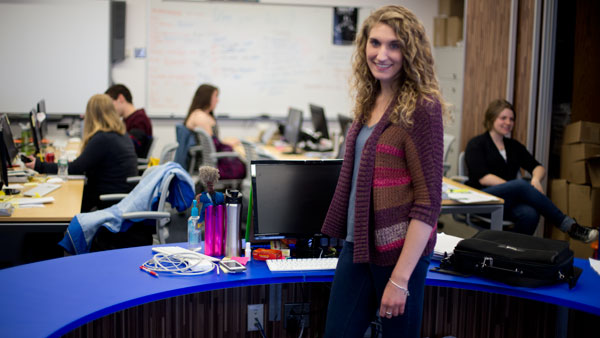Arriving at Ithaca College four years ago, I never imagined spending one of my first Sunday afternoons in a staff meeting for the Accent section of The Ithacan. Looking around the room half full of seasoned reporters chomping at the bit to claim music reviews and front-page features, I was among the other half: deer-in-the-headlights freshmen paralyzed by words like “AP style,” “noon deadlines” and “must record” spewing from the editors’ mouths.
Three years later, I had that same transfixed stare when asked to step up and become the 2013–14 editor-in-chief of the very newspaper that once intimidated me. It dazzled me that after dancing around the editorial board for a few years, switching my major and even taking a year-long hiatus to delve into the world of event planning, my calling senior year was, in fact, to lead The Ithacan.
At first, I was afraid to confront how much the newspaper was a part of my identity and how much more it would become a part of me by stepping into this role. But, after measuring pros and cons and having conversations with mentors and former editors, it was clear there was no other way I would have wanted to spend my senior year.
The most rewarding part about leading the newspaper this year has been working with individuals committed to the journalistic values of fairness, accuracy and truth-telling. I was originally drawn to journalism because of its power to tell stories that can move people or ideas to action. The Ithacan has been that very outlet, pushing me to adhere to principles of transparency, justice, truth and compassion
as I very actively set the news agenda for the college.
The most challenging part about managing a media organization is holding yourself and your team of editors and reporters accountable to those journalistic standards every single day. As journalists, we have the privilege to use a medium that speaks for and speaks to others. With this position of power, we also have a responsibility and duty to speak with the community in which we report — but we rarely consistently do.
When journalists fail to understand their readers’ diversity of perspectives and identities, their ignorance not only perpetuates stereotypes and suppresses dialogue, but also weakens the credibility of the reporters and the institutions for which they work.
The power we journalists have to choose what to cover, and the subsequent responsibility of that choice, makes our contributions to society very active ones. All of our actions affect the consciousness and willpower of media consumers. We therefore must strive beyond complacency in reporting.
This year, we have seen the Student Government Association launch a task force to dismantle microaggressions and the African Students Association create a photo campaign to debunk stereotypes about Africa and Africans. Students have also been resilient in demanding the college divest from fossil fuels and the City of Ithaca reform its prison agenda. As a student media outlet, with students coming foremost, not aligning ourselves with these initiatives would be a disservice to our community fighting for positive change.
On this campus in particular, journalists must know who they are reporting with, who they are reporting for and why. As journalism becomes more dialogical in nature, it takes a genuine interest and commitment to being consistently present to gain the critical consciousness necessary to carry this college forward.
This initiative will come from the ground up, with students first. The student media must be an ally in this effort by representing all sides of all issues and all people in all movements. As I hand over the reins, I am reminded that this last issue of the newspaper may symbolize the end of my tenure leading The Ithacan, but it also marks the beginning of the work that I must continue to do as a professional working for positive change.














